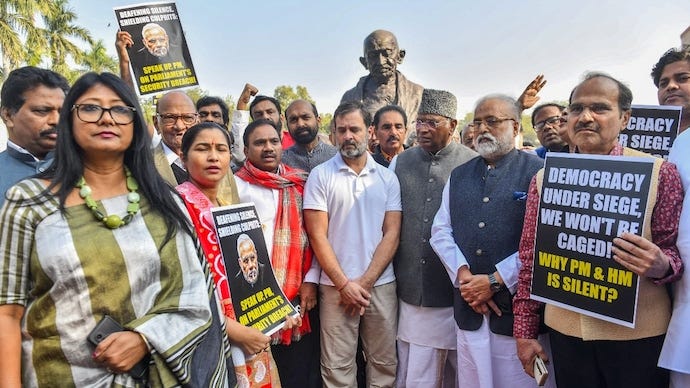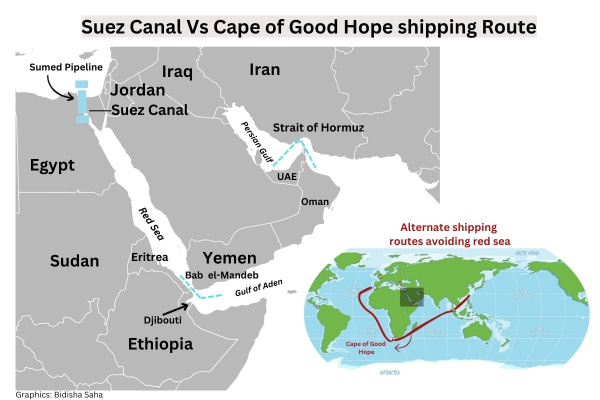Hey buddy! Glad to see you here. Welcome to Wednesday, 20th December 2023’s Matters that Matter. Happy Reading :)
1. Opposition benches are almost empty
A day after 78 Opposition MPs were suspended from Parliament in the highest single-day suspensions so far, another 49 Lok Sabha members were suspended for the rest of the session on Tuesday, taking the total to 141.
The latest suspensions left the Opposition benches almost empty in Lok Sabha on a day that it took up important legislation seeking to overhaul criminal laws, the Bharatiya Sakshya Bill 2023, Bharatiya Nyaya Sanhita 2023, and Bharatiya Nagarik Suraksha Sanhita 2023, to replace the Indian Evidence Act, Indian Penal Code, and Code of Criminal Procedure respectively.
With the INDI alliance having lost more than two-thirds of its strength for the duration of the Winter Session, the following bills were passed by voice vote after a short debate:
The Central Goods and Services Tax (Second Amendment) Bill, 2023- aims to bring certain sections of the CGST Act dealing with appellate tribunals in consonance with the Tribunal Reforms Act-2021 eg the maximum age limit for the post of the President of Tribunal and provision relating to the eligibility of an Advocate with a standing of 10 years at the Bar for appointment as Judicial Member.
The Provisional Collection of Taxes Bill, 2023- will give immediate effect to the changes in customs and excise duties announced in the Budget. It seeks to obtain the authority from Parliament to provisionally levy and collect the newly imposed or increased duties of customs and excise for 75 days.
The National Capital Territory of Delhi Laws (Special Provisions) Second (Amendment) Bill (read below)
Author’s Remarks
In 1989, Rajiv Gandhi flexed his 400-plus muscle to suspend 63 MPs, but the way the power has been used this time is a new in Parliamentary history. The Opposition MPs demanded that the Home Minister inform the House about the security lapse on December 13. Indeed, this is a valid demand. An FIR and six arrests cannot be the closure to this breach.
Slogans were shouted, placards waved, and a few MPs tried to clamber onto the Speaker's dais on Monday. A video from Parliament complex showed Trinamool Congress leader Kalyan Banerjee ostensibly mimicking Rajya Sabha Chairman and Vice-President Jagdeep Dhankhar and Congress leader Rahul Gandhi recording it. MPs used posters with morphed pictures of PM Modi.
All of this is undeniably a non-parliamentary behavior and can not be expected out of MPs that represent the world’s largest democracy, however, suspending 141 of them can also not be justified:
Opposition is an equally important pillar for a democratic nation - After humongous victories in the Assembly elections, BJP leadership is at a new high. Its arithmetic in both Houses of Parliament is rock-solid, giving it the most unequivocal of mandates, which is in fact good since it portrays a strong image of India as a nation in front of the world but the MPs’ suspension also means the about five crore people they represent no longer have a voice in Parliament. The fact that they are all from the Opposition further salts that wound.
Dangerous precedent- It also sends a message to Assemblies, presiding officers, and indeed, all ruling parties that you can rid the legislature of the Opposition- if you so wish. This sets a very dangerous precedence.
2. Disruption in shipping map could impact India's economy
The world’s largest shipping companies have started to re-route vessels away from the Red Sea, creating delays and extra costs that could be felt worldwide through higher prices for oil and other imported goods.
A militia, Houthi, backed by Iran in Yemen, has disrupted shipping in the crucial shipping lane that connects the Indian Ocean with the Suez Canal, through which about 12% of world trade passes each year.
The United States has promised to lead a group to help defend the area against the Houthis, who have targeted commercial vessels with missiles and 5 drones in the past few weeks. As a result of the attacks, freight and insurance rates have already increased, and oil prices are rising.
India is heavily reliant on the Bab-el-Mandeb Strait (which connects the Arabian and the Mediterranean Sea via the Red Sea and Suez Canal) for its crude oil, LNG imports and trade with parts of West Asia, Africa, and Europe and any disruption to shipping through the strait could have a significant impact on India's economy and security.
If you haven’t subscribed yet, you might like to spare a second to do so :P Not only will you never miss a beat on the global hot topics but it also helps me to know if I am adding value to the community. For me, it’s a token of appreciation and support from my sweet friends for my efforts :)
Freight rates for Indian shipments headed to Europe and Africa could surge as much as 25- 30% if this continues. It also comes at a time when exports are already slowing due to sluggish global demand.
3. Explainer on Amendment in the National Capital Territory of Delhi Laws
No punitive action such as demolitions or sealing can be taken against certain categories of slum dwellers, hawkers, and unauthorized colonies in Delhi for another three years. On Tuesday, both houses of parliament passed The National Capital Territory of Delhi Laws (Special Provisions) Second (Amendment) Bill, 2023 to extend the protection, which would have ended this year, until December 31, 2026.
The Act says that orderly arrangements have to be made for the relocation and rehabilitation of residents of slums and jhuggi clusters.
What is the background of this law (and its amendments)?
Following orders passed by the Delhi High Court and Supreme Court, the Municipal Corporation of Delhi began a sealing drive in 2006 against unauthorized city construction. The drive, which targeted lakhs of residents of 1,731 unauthorized colonies, was politically unpopular - so the UPA government enacted The Delhi Laws (Special Provisions) Act, 2006 to protect certain kinds of unauthorized constructions for a period of one year. Thereafter, the protection has been extended from time to time by both UPA and NDA govt.
Under NDA, the Act in 2019, conferred ownership rights to residents of unauthorized colonies, and the development control norms for these colonies were notified on March 8, 2022. However, the work is still in progress.
So what happens here onwards?
While the protections have been extended for years now, the question remains: how long will the status quo continue, and will there be another extension in 2026?
According to the Minister, the work on conferring ownership rights that started in 2019 was delayed by the Covid-19 pandemic. He told Lok Sabha that about 40-50 lakh individuals live in unauthorized colonies, which means 8-10 lakh households could be eligible for ownership rights. So far, only 4 lakh registrations have taken place.
- References and Excerpts from The Indian Express
If you read till the end, I am so proud of you for being a responsible and informed citizen of the world! Don’t forget to pass the baton to your friends by sharing this article.
Your suggestions are invaluable and would help Matters that Matter to improve and deliver to the community better. So, feel free to reach out!
Until then, sending lots of best wishes and love <3






